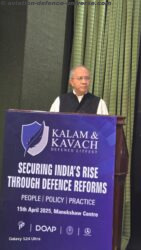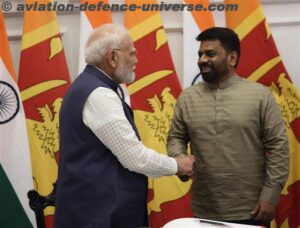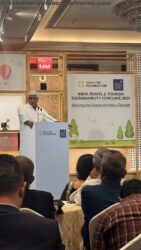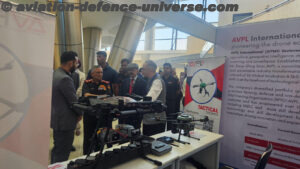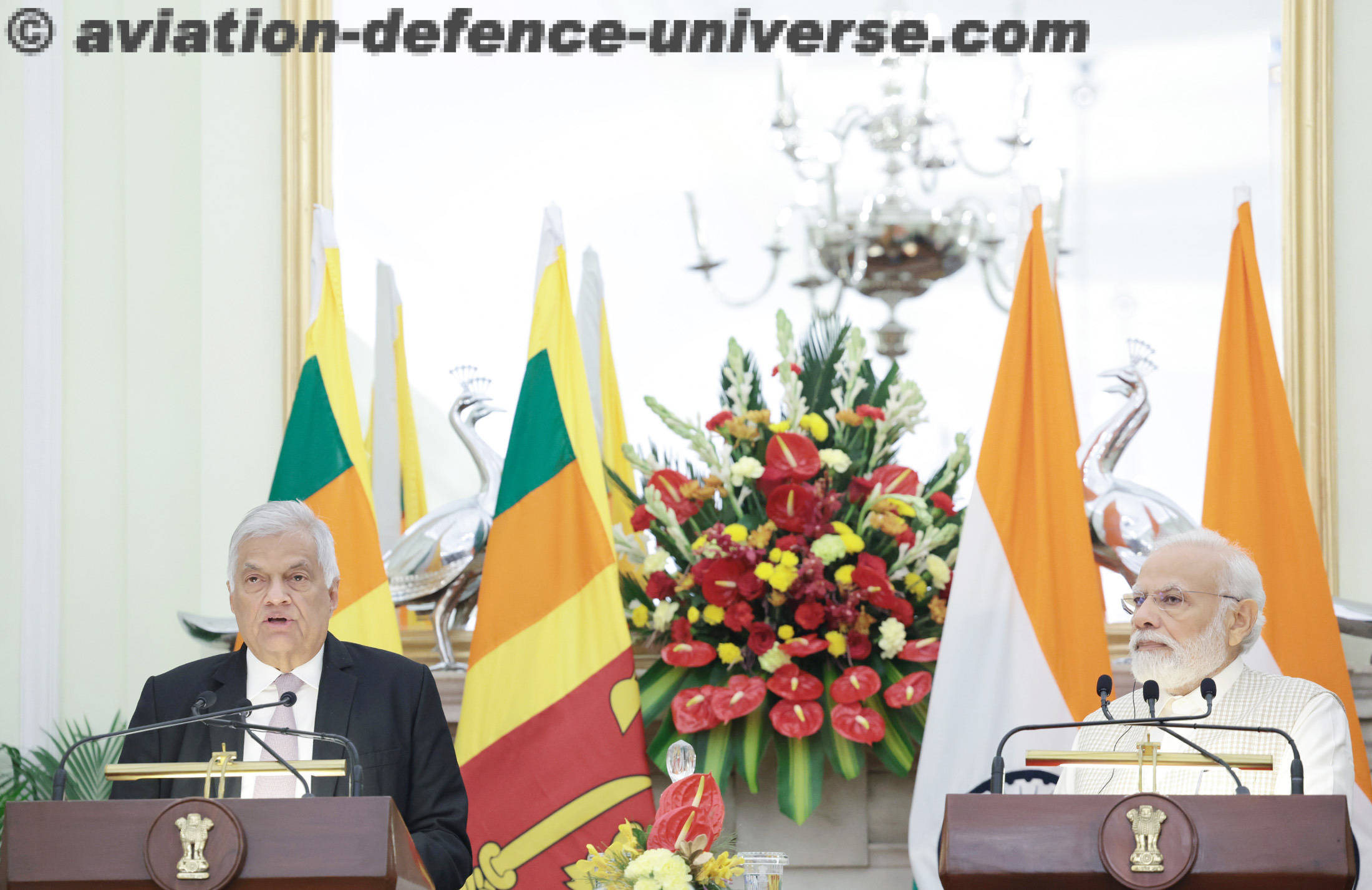
By Jai Kumar Verma
New Delhi. 09 August 2023. Normally a visit by the neighbour doesn’t raise eyebrows. It is the most expected thing to happen. But the geopolitics of the Indian Ocean region makes heads turn when Indian and Sri Lankan leaders visit each other. Recently when Sri Lankan President Ranil Wickremesinghe came to India on an official visit, all eyes were on New Delhi, all the more so because this was his first visit to India, after a year of coming into power. Needless to say, he met both the Indian President and Prime Minister.
Indian Foreign Secretary Vinay Kwatra was in Colombo to do the groundwork before the visit of President Wickremesinghe to India. Indian Foreign Secretary besides meeting his counterpart and Sri Lankan Foreign Minister, also met the Sri Lankan President. Kwatra stated that Sri Lanka is not only an important partner in India’s Neighbourhood policy but also plays a significant role in Vision Sagar.
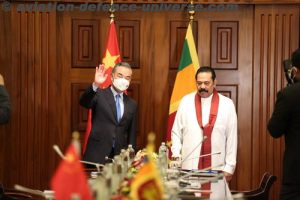
Last year when Sri Lanka encountered its worst economic crisis Delhi under its ‘Neighbourhood First Policy’ assisted Sri Lanka through financial assistance worth $4 billion. India supplied food, medicine, and fuel. The Indian assistance helped Colombo which had the debt of $83 billion out of which 41.5 billion was foreign debt. According to an important think tank Chinese share is about 20 percent of total foreign debt. China is Sri Lanka’s biggest bilateral creditor. India was the first creditor which gave letter of support to Colombo about restructuring of loan which helped the island nation in getting a package of $3 billion from International Monetary Fund.
India is member of an official creditor’s committee with Japan. Delhi is also trying to help Colombo through Paris Club, which includes major creditor countries. These countries co-ordinate and try to evolve workable solutions for the countries which are facing economic crisis. China, Japan, and India are three major money lenders to Sri Lanka. India is an important creditor, and its outstanding loan is $1.9 billion.
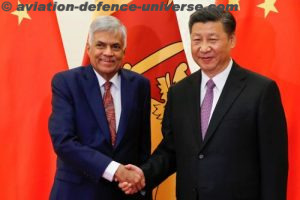
But the story doesn’t end here. After India, President Wickremesinghe is all set to make his maiden visit post becoming the President to China also in October. The Chinese Foreign Minister is scheduled to lead a mission to Sri Lanka prior to the President’s visit. In addition to considering prospective new projects, the visiting Chinese group was anticipated to assess the highway project, the proposed projects for the Colombo Port Financial City, and the investments near the Hambantota area. After highlighting the advancements made with the Domestic Debt Optimisation (DDO) program, Foreign Minister Ali Sabry told the media during his recent visit to China that he also discussed re-negotiating debt repayment with China’s Exim Bank.
Last year India’s financial assistance to Sri Lanka was crucial as at that time Colombo exhausted its dollars and it was difficult for the country to import essential items like fuel, medicines etc. Prime Minister Modi mentioned that “The past one year has been full of challenges for the people of Sri Lanka. Being a close friend, as always, we stand shoulder-to-shoulder with the people of Sri Lanka”.
Both the countries are determined to enhance the bilateral ties on multiple fields including power, trade, higher education, energy, and people to people contact. Sri Lanka is very keen that Indian tourists visit the island country. Tourism is an important foreign exchange earner for the country and tourist industry suffered badly due to Covid pandemic and at present it is suffering because of Russian Ukraine war. Both countries gave emphasis on increasing maritime and air connectivity. Both Delhi and Colombo would also work to connect their electricity grids and would also assess the practicality of constructing a petroleum pipeline between both the countries. The construction of the pipeline would be an expensive affair but supply of oil or gas through pipeline is more reliable as well as less costly. India is also agreeable to invest more in Trincomalee as India wants to make it a trade centre.
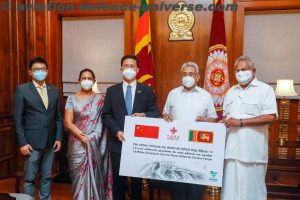
Both countries would increase passenger ferry service, number of flights would also be enhanced. Efforts would also be made to construct a land bridge across the Palk Strait between Tamil Nadu (India) and Jaffna district which is the Northern province of Sri Lanka. At few places in Palk Strait the distance between both the countries is only about 50 K. Ms or less. If the ‘land connectivity’ is established, then India would get easy access to Colombo and Trincomalee ports. The power grids would be connected through undersea cables and the estimated expenditure would be $ 4 billion. The visiting president is ready to accept rupee for bilateral trade as well as to use United Payments Interface (UPI).
India and Sri Lanka would also negotiate to enhance Economic and Technological Cooperation and signed multiple agreements pertaining to energy, renewable energy, and trade developments. Sri Lankan President’s visit is also an indication that Sri Lanka appreciates the assistance rendered by India last year when the country was passing from a difficult financial crisis. The Sri Lankan watchers feel that Colombo would need India’s assistance to boost its economy, retune its bureaucracy and decision-making methods.
The visiting President also agreed to execute an India supported scheme under which Sri Lankan Tamil population would share power with Sinhalese majority community. Rajapaksa’s delegation also included two Tamil ministers. Modi stated that “We hope that the government of Sri Lanka will fulfil the aspirations of the Tamils.”
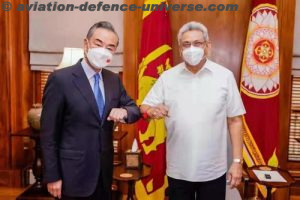 India and Sri Lanka have old and traditional cordial relations, nevertheless China in view of Sri Lanka’s strategic location in the Indian Ocean, enhanced its influence on the island nation. Not only this China which considers India as its potential adversary also tries to encircle India. China with its deep pockets gave loan to Sri Lanka on the name of developing the infrastructure. Large amount of loan on the name of infrastructure development gave an advantage to China over India. However, Beijing gives loan on stringent terms, and it becomes difficult for the developing nations to repay the loan. Sri Lanka became victim of Chinese debt trap and its economy collapsed although Chinese loan was not the only reason, but it also contributed in the collapse of Sri Lanka’s economy.
India and Sri Lanka have old and traditional cordial relations, nevertheless China in view of Sri Lanka’s strategic location in the Indian Ocean, enhanced its influence on the island nation. Not only this China which considers India as its potential adversary also tries to encircle India. China with its deep pockets gave loan to Sri Lanka on the name of developing the infrastructure. Large amount of loan on the name of infrastructure development gave an advantage to China over India. However, Beijing gives loan on stringent terms, and it becomes difficult for the developing nations to repay the loan. Sri Lanka became victim of Chinese debt trap and its economy collapsed although Chinese loan was not the only reason, but it also contributed in the collapse of Sri Lanka’s economy.
Colombo is passing through a difficult economic watershed and unfortunately Sri Lankans are leaving the country. 150 thousand Sri Lankans have already left, and it is expected that about 300 thousand people would leave the island nation this year. Hence there would be dearth of skilled workers and the brain drain would make early economic recovery difficult.
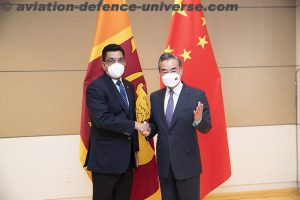 Nonetheless, Sri Lanka is under pressure of Chinese debt cannot speak against Beijing. Recently Sri Lankan Foreign Minister Ali Sabry stated in an interview given to South China Morning Post that Sri Lanka will not take any country’s side and will also not harm any country. He made it clear that Sri Lanka would be neutral. He mentioned in the interview that “We want India and China to talk to each other and resolve their differences and that will be better for both countries, better for the world,”. President Wickremesinghe also mentioned that Sri Lanka would be neutral between India and China. It would be good for China but for India which has close cultural, religious, and ethnic relations from ages it is a relegation from its position.
Nonetheless, Sri Lanka is under pressure of Chinese debt cannot speak against Beijing. Recently Sri Lankan Foreign Minister Ali Sabry stated in an interview given to South China Morning Post that Sri Lanka will not take any country’s side and will also not harm any country. He made it clear that Sri Lanka would be neutral. He mentioned in the interview that “We want India and China to talk to each other and resolve their differences and that will be better for both countries, better for the world,”. President Wickremesinghe also mentioned that Sri Lanka would be neutral between India and China. It would be good for China but for India which has close cultural, religious, and ethnic relations from ages it is a relegation from its position.
All other creditors agreed to negotiate jointly to reschedule Sri Lanka’s debt but China which has a share of about 20% of Sri Lanka’s debt stated that it would negotiate its loan with Colombo bilaterally. It gives an advantage to China. Last time Colombo had to surrender Hambantota port to China.
Modi in his speech mentioned that security is a major worry of India. He also mentioned that security and development are linked to each other, but Wickremesinghe not mentioned anything about security in his speech. He emphasised on economic and bilateral relations. India cannot stop China as it has deep pockets and Sri Lanka needs investments, rescheduling of its debt and loan from IMF. China is biggest lender and is in position to invest more money in island nation. Although now India is also investing in Sri Lanka in developing infrastructure & energy but first of all it is not enough and secondly it would take more time. Hence Colombo would, not abandon China but India has numerous important points in its favour which China does not have. India’s people to people contact is much stronger, India has cultural as well as religious ties. India should exploit these favourable points.
Srilanka Besides it, Indian economy is growing at a much faster pace than China. Chinese local governments are under heavy debt and these local bodies are not in a position to repay the debt. Few local bodies have forged documents to show that they are economically strong. Several countries took loan from China but now they are not in a position to repay the debt these countries want to reschedule the loan.
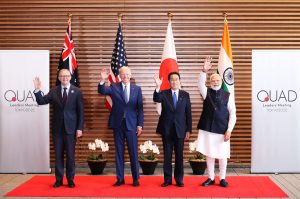 Not only this-Japan, South Korea, India, Vietnam, and United States are realising the aggressive behaviour and expansionist tendencies of China hence these countries are trying to reduce its trade with China. Hence it may be possible that Beijing may not be able to invest much more in Sri Lanka. In its economic debacle Colombo must have realised the difference in the approach of India and China. India helped Colombo as a true well wisher while China wanted to exploit the situation.
Not only this-Japan, South Korea, India, Vietnam, and United States are realising the aggressive behaviour and expansionist tendencies of China hence these countries are trying to reduce its trade with China. Hence it may be possible that Beijing may not be able to invest much more in Sri Lanka. In its economic debacle Colombo must have realised the difference in the approach of India and China. India helped Colombo as a true well wisher while China wanted to exploit the situation.
(Jai Kumar Verma is a Delhi-based strategic analyst and member of United Services Institute of India and Institute for Defence Studies and Analyses. The views in the article are solely the author’s. He can be contacted at editor.adu@gmail.com)






































